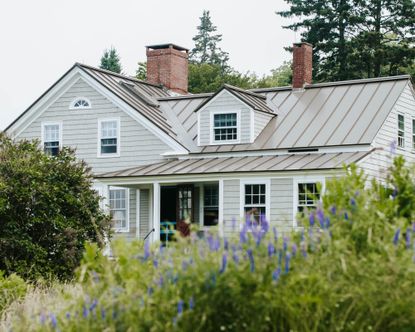If you're a first-time buyer, chances are you are underestimating the costs of homeownership, along with a whopping 40 percent of homeowners, according to brand-new research. From property taxes to roof repair costs and utilities, there's a number of additional costs that come after the home purchase that many people are simply unaware of – until they get the bill.
But by far the biggest cost that catches new homeowners unaware is property maintenance. According to the research, 35 percent of Americans weren’t aware of maintenance costs before purchasing their home, making it the most common unexpected expense. As a result, 30 percent of homeowners wished they’d waited to buy their home based on the costs of upkeep, with half having had to put the necessary additional costs on their credit cards.
Want to avoid this scenario? We've asked Claire Cole, a researcher and real estate expert who works on behalf of Cinch Home Services, for her top tips on finding out how much property maintenance will cost before committing.
- Find out what' home prices are doing using our latest housing market forecast
Learning to ask the right questions

The main thing first-time buyers get wrong is not asking enough of the right questions about the property, says Claire. A home may look nice enough during the viewing, with no obvious flaws such as mold or crumbling paintwork. This isn't enough to determine that there won't be thousands to pay in expensive maintenance further down the line: 'When a prospective homebuyer finds a “dream home” that appears within their budget, it’s tempting to dive in and start imagining how they’ll arrange the space. However, it’s important to maintain discipline and ask themselves, and their realtor, a few important questions. For example, how old is the house and when was it last renovated?'
Claire explains that it doesn't necessarily matter if the house looks good now: 'If it’s an older home that hasn’t had any recent upgrades, it may be a sign to prospective homebuyers that they should anticipate higher home improvement costs in the future (that won’t appear in the initial asking price).' If you still want the house, just be aware that it's highly unlikely it won't need any work in the next few years, so you'll need to be prepared for this financially.
Don't forget about appliances

'Another area buyers tend to overlook, and ought to inquire about, is the age of the home’s appliances', says Claire. It's not that home buyers don't realize that appliances need replacing, but it turns out that many don't realize just how expensive such replacements can be: 'While we found that homeowners generally have a good sense of the average lifespan of a given appliance, they tend to underestimate the cost of a new replacement. If homebuyers know in advance how long they’ll be able to forgo new appliance purchases, they can save themselves from unpleasant surprises related to replacement costs and can do further research to budget accordingly.'
In other words, if you 'dream home' has an old stove, old washing machine and dishwasher, expect some serious costs in the first few years of moving in – will you be able to afford all these new appliances? Claire summarizes: 'Identifying these potential concerns upfront may help buyers have a better sense of the real cost of owning and maintaining their household, and prepare to save for potential investments needed down the line.'


